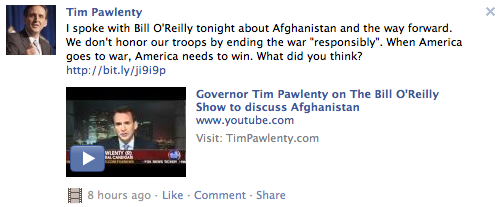President Obama’s announcement on Wednesday night of his intention to withdraw around 33,000 troops from Afghanistan by the end of next summer is a much-needed precursor to the end of our military engagement there. The nation-building that needs to be done in Afghanistan is not something we are able to make happen with the sword: It is imperative that we seek meaningful social services and social interventions to reduce the social ills that breed terrorism. The alternative is creating more of the social and economic instability brought by war, thus sustaining terrorist recruitment and organizations. Of these facts there should be little doubt.
However, some Americans seem to have a very different conception of our military presence in Afghanistan. It is important to dissect these concepts so that we can understand the world that we as changemakers are operating in. I point out, for example, Tim Pawlenty’s response to President Obama’s address on his 2012 campaign facebook page:
Mr. Pawlenty is one of many who see our role in Afghanistan not as nation-builders, nor as healers, nor as changemakers. To him, our troops are Roman legions, sent to seek victory – whatever it is – above all else. The war is unsustainable; putting more troops in harms way provides no tangible benefit to us or to the people of Afghanistan. Yet, Mr. Pawlenty seems to be under the impression that whatever “winning” might be, it is of the utmost importance, and the only way to achieve it is to continue to send soldiers to fight it until he is satisfied America has won.
This is not to say that Mr. Pawlenty and others who believe what he believes might not have the best of intentions (that argument is for a different venue). However, his potentially good intentions are wasted on an unclear goal (“winning”) that involves unsustainable methods that no one can seriously deny are unable to effect the changes needed in Afghanistan. Is the goal to reduce terrorist threat coming from Afghanistan, or to fight until we win? And if so, what is there to win?
How is this approach – the idea of “winning” at all costs, and only by an fixed set of methods – like so many well-intended ideas so flawed? And how many among us in the social services and intervention community suffer from the same inability to think beyond our ideas to deliver meaningful and sustainable changes where they’re needed most? We have all seen the well-meaning individuals and foundations who can’t effect change because their goals don’t make clear sense, and their methods are so frozen that they are unable to adapt to the world as it is. We know what’s wrong with them: Their model is stuck, just like Mr. Pawlenty’s, on an unachievable or vague goal that renders them unable to think of new ways to achieve desired outcomes.
In our own lives as people dedicated to causes, we need to step back and assure that we are not satisfied to live in this paradigm of victory over outcomes. Plodding through on our ideals, not recognizing when programs aren’t working the way we thought they’d be, or that methods need revision, or even that, as is often the case, the target moved just as you were getting close to it – all of these things are pitfalls on the way to making meaningful interventions and sustainable change. It is necessary that we remember that our actions need to be based on reality, and focused on clear goals that bring us incrementally closer to permanent solutions and real change.
Mr. Pawlenty’s response to President Obama will gain him (and the President) some political points. But applying the critique we might offer of his statements to our own lives and aspirations as changemakers is critically important.



